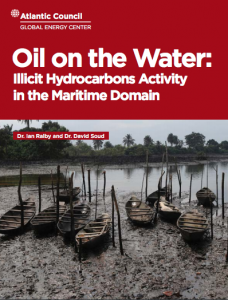Full Title: Oil on the Water: Illicit Hydrocarbons Activity in the Maritime Domain
Author(s): Dr. Ian Ralby and Dr. David Soud
Publisher(s): Atlantic Council Global Energy Center
Publication Date: April 1, 2018
Full Text: Download Resource
Description (excerpt):
Pirates seizing oil tankers off West Africa or Southeast Asia and selling off their cargos. Counterfeit
fishing boats ferrying loads of illicit diesel from offshore tankers to waiting smugglers
in Thailand, who then sell it to finance an insurgency. Artisanal fishermen launching lucrative careers smuggling subsidized Ecuadorian fuel into Colombia and Peru, where it will be used to manufacture cocaine. Offshore oil-prospecting licenses distributed to well-connected individuals, and then flipped to oil companies for massive profits. Ship-to-ship transfers being exploited to inflate prices, bust sanctions, and conceal the flow of illicit product. Organized criminal groups and renegade militias linking operations across the Mediterranean to traffic in fuel, weapons, and persons.
Oil and fuel theft is big business—globally, it adds up to tens, if not hundreds, of billions of dollars annually—and much of that criminality makes use of the maritime space. Whether in small fishing boats or Suezmax tankers, illicit oil and fuel move constantly, in broad daylight, around the world. And the profits, which deprive states of much-needed revenue, often fund more sinister criminal activities, from other forms of trafficking to terrorism.
It is vital that all stakeholders understand the various modalities of maritime hydrocarbons crime—as well as the recommended methods to combat it.
